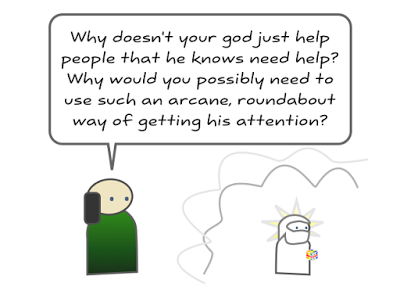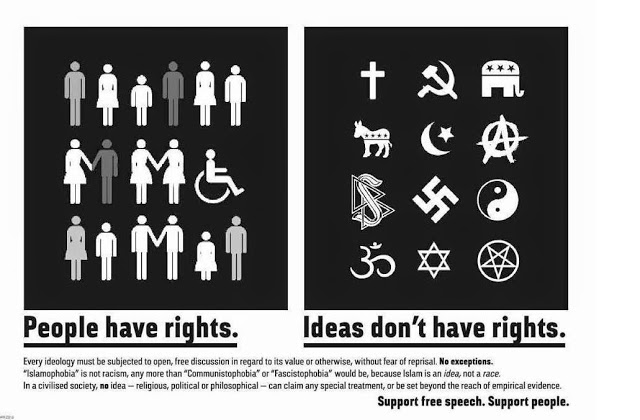“Be Ye Reconciled to God”
2 Corinthians
LDS manual: here
Purpose
To encourage readers to be charitable toward those with whom we disagree.
Reading
Paul’s back for another go at the Corinthians.
Main ideas for this lesson
Does prayer help?
Paul starts off by thanking the Corinthians for their prayers.
2 Corinthians 1:11 Ye also helping together by prayer for us, that for the gift bestowed upon us by the means of many persons thanks may be given by many on our behalf.
Here’s some explanation from the LDS Gospel Doctrine manual:
Paul thanked the Saints who had prayed for him and Timothy in their time of adversity (2 Corinthians 1:11). Why is it important for us to pray for each other? How have the prayers of others blessed you or someone you know? How are we blessed when we pray for others?
Presumably, God knows what everyone needs. Yet he needs to be constantly reminded who needs help. So either he doesn’t remember whom to bless, or he know and he doesn’t care to do it until enough people beg him.
I made a cartoon on this topic. At the time, I was thinking of how strange it was that Mormons would not only pray for someone, but — if you needed to bring out the big guns — write down someone’s name and put it in a temple. What’s the difference? Why would one work better than the other? It’s a question I still wonder about.
But who needs a temple? Prayer alone is useless enough as it is.
Unbelievers are blind.
Ask: Why don’t some people believe in God or Jesus or the church?
Possible answers:
- They find that there’s no evidence for the claims.
- They tried it, but didn’t like it.
- Thy didn’t think it was relevant for their life.
There may be any number of valid reasons not to believe. But not in Paul’s world. For Paul, if someone doesn’t believe, they are blind.
2 Corinthians 3:12 Seeing then that we have such hope, we use great plainness of speech:
3:13 And not as Moses, which put a veil over his face, that the children of Israel could not stedfastly look to the end of that which is abolished:
3:14 But their minds were blinded: for until this day remaineth the same veil untaken away in the reading of the old testament; which veil is done away in Christ.
3:15 But even unto this day, when Moses is read, the veil is upon their heart.
3:16 Nevertheless when it shall turn to the Lord, the veil shall be taken away.
It’s even worse than that. They may be affected by Satan, the “god of this world”.
2 Corinthians 4:3 But if our gospel be hid, it is hid to them that are lost:
4:4 In whom the god of this world hath blinded the minds of them which believe not, lest the light of the glorious gospel of Christ, who is the image of God, should shine unto them.
This is a really unhelpful and disrespectful way of reasoning.
It might come as a surprise that I should say this, when I have an entire blog (or two) devoted to pillorying religious belief. How can I talk about respecting belief?
It’s like this: there are beliefs, and there are people. People should be respected, but beliefs need to be examined without mercy.
Religious people often conflate the two. They think I’m being disrespectful to them when what I’m really doing is speaking out against the belief. That usually means they’ve identified too closely with their beliefs. They’ve essentially traded their own goals and identity for that of the religion. At times, this demand for respect is an attempt to silence opposition.
To sum up, I draw a distinction between ideas and people. So notice the difference:
- When I say that someone is wrong on religion, I’m saying the ideas are wrong, and they are mistaken.
- When Paul says that someone is wrong on religion, they are somehow under satanic agency.
In this situation, how can a believing Mormon respect their spouse who no longer believes, when their views are considered not only wrong, but somehow evil? How can a parent have a relationship with a child who sees no need for the religion under these circumstances?
Ask: If you are an unbeliever, how can you do better than Paul did?
Answers:
- We can see believers as good people with whom we disagree.
- We can refrain from saying that believers are stupid, remembering that we weren’t stupid when we believed. We just relied on some very human forms of reasoning. We wanted to defend our beliefs — we were told over and over again that beliefs must be defended.
Paul’s accusation of others as blind is particularly galling when he admits that his own approach is to walk by faith, and not by sight.
2 Corinthians 5:6 Therefore we are always confident, knowing that, whilst we are at home in the body, we are absent from the Lord:
5:7 (For we walk by faith, not by sight🙂
And to make it worse, he puts a smiley after it. Full points for being on the cutting edge of online trends, but really, Paul.
It gets even worse. Paul advises against having relationships with unbelievers.
2 Corinthians 6:14 Be ye not unequally yoked together with unbelievers: for what fellowship hath righteousness with unrighteousness? and what communion hath light with darkness?
6:15 And what concord hath Christ with Belial? or what part hath he that believeth with an infidel?
Ask: What does Paul’s final question mean in modern English: “What part hath he that believeth with an infidel?”
Answer: It might mean something like “What agreement can they have? How can they have any common ground?”
Isn’t it telling that religious beliefs make it difficult to find common ground? Paul can’t imagine how it could be done. Fake belief systems cause division.
This kind of separation is absolutely necessary to maintain the fragile bubble of faith. When a belief has no evidentiary support, it’s difficult to keep believing it, and it needs a carefully controlled environment to maintain it. Merely speaking against it can be enough to make that bubble pop. This is why believers are so touchy about criticism of their beliefs. They know the belief can’t sustain scrutiny, and they’re trying very hard to keep that bubble.
I have found that, while it can be difficult relating to someone on the opposite side of a faith divide, it’s much easier from the unbelieving side. I think they’re wasting their time, but at least I don’t believe that there will be any eternal consequences (torture or isolation) for them. On the other hand, the believer seems to approach the matter with a great deal of anxiety for the eternal soul of their friend or family member. What a lot of unnecessary suffering.
Godly sorrow
You know what I really hate about the LDS Church? It takes normal things and, by outlawing them, makes them a source of guilt and shame.
It’s good to feel bad about rotten things we do, but it’s not great to invent sins and make people feel bad about them.
Daniel Dennett mentions this in his talk, “How to Tell You’re an Atheist”.
At about 6:45 –
“As you know, we atheists are a happy lot. We’re deeply moral but we don’t have a mountain of artificial guilt. We do feel guilty about our misdeeds but we don’t consider them sins.”
On the other hand, Paul is glad when people feel guilty in ways that work for him.
2 Corinthians 7:8 For though I made you sorry with a letter, I do not repent, though I did repent: for I perceive that the same epistle hath made you sorry, though it were but for a season.
7:9 Now I rejoice, not that ye were made sorry, but that ye sorrowed to repentance: for ye were made sorry after a godly manner, that ye might receive damage by us in nothing.
7:10 For godly sorrow worketh repentance to salvation not to be repented of: but the sorrow of the world worketh death.
From the LDS Gospel Doctrine manual:
What is the difference between godly sorrow and “the sorrow of the world”? Why is godly sorrow an important part of repentance?
President Spencer W. Kimball explained: “If one is sorry only because someone found out about his sin, his repentance is not complete. Godly sorrow causes one to want to repent, even though he has not been caught by others, and makes him determined to do right no matter what happens. This kind of sorrow brings righteousness and will work toward forgiveness” (Repentance Brings Forgiveness [pamphlet, 1984], 8).
Well, I agree that if you’ve done something wrong, it’s not great if you feel bad just because you got caught.
Let’s turn our discussion to the behaviour of the LDS Church. For decades, it has been intentionally fuzzy about its past (to put it kindly). It has promoted a sanitised, feel-good version of its history. When others have published the facts, they have been dismissed as anti-Mormon lies. At times, the church has “flashed” the facts here and there, in ways that would not attract a lot of attention. This has allowed apologists to claim that the facts were always out there, and if people hadn’t noticed them, this was due to their lack of diligence.
That tactic only worked when information was scarce. But in our age of information, people have learned facts about the church that they didn’t hear in church. And so now that enough people are leaving to affect the bottom line, the church has finally begun to open up a little about its past. Not in advertising this information, but by producing what can only be described as apologetic essays, anonymous and unpublicised.
Discuss: Is the church trying to be honest about its past, and do better? Or is it just trying to get its version of the story out there? If the latter, how is this different from someone who feels bad because they got caught?
Additional lesson ideas
Paul’s “thorn in the flesh”
According to 2 Corinthians, Paul had an unspecified infirmity. The LDS Gospel Doctrine manual says:
• Paul said that the Lord gave him an infirmity — a “thorn in the flesh” (2 Corinthians 12:7). Why did the Lord give Paul this infirmity? (See 2 Corinthians 12:7.) What did Paul learn when the Lord did not take away his “thorn in the flesh” as he had asked? (See 2 Corinthians 12:8–10.) How can our weaknesses help us receive strength from Jesus Christ? (See Ether 12:27.) How have you seen the truth of Paul’s statement that “when I am weak, then am I strong”?
Here’s the scripture that pertains.
2 Corinthians 12:6 For though I would desire to glory, I shall not be a fool; for I will say the truth: but now I forbear, lest any man should think of me above that which he seeth me to be, or that he heareth of me.
12:7 And lest I should be exalted above measure through the abundance of the revelations, there was given to me a thorn in the flesh, the messenger of Satan to buffet me, lest I should be exalted above measure.
12:8 For this thing I besought the Lord thrice, that it might depart from me.
12:9 And he said unto me, My grace is sufficient for thee: for my strength is made perfect in weakness. Most gladly therefore will I rather glory in my infirmities, that the power of Christ may rest upon me.
So what was Paul’s infirmity? It’s possible that it had something to do with his eyes, as he says to the Galatians:
Galatians 4:15 Where is then the blessedness ye spake of? for I bear you record, that, if it had been possible, ye would have plucked out your own eyes, and have given them to me.
On the other hand, a friend of mine takes the view that, with Paul’s hatred of women, it was probably something only fixable recently with a little blue pill.
Satan is allowed to impersonate angels of light
Here’s an odd scripture to finish on.
2 Corinthians 11:13 For such are false apostles, deceitful workers, transforming themselves into the apostles of Christ.
11:14 And no marvel; for Satan himself is transformed into an angel of light.
Let’s consider the context. Paul is trying to lead a church of people with lots of differing views. It must have been a challenge to retain his leadership! After all, anyone could claim thy’d received a vision from an angel of light, and place themselves over Paul.
When you’re in that position, what do you do? You tell people not to believe their experiences, and to believe yours instead. And this is what Paul does.
The problem is that by saying this, Paul is admitting that God’s plan is so confusing that satanic agents are allowed to impersonate divine ones. God maybe should have rethought that.




27 September 2015 at 6:33 pm
Your closing point reminds me of the Book of Mormon story of Korihor, who said, "[T]he devil hath deceived me; for he appeared unto me in the form of an angel." How the hell is any spiritual experience to be trusted if even an angelic vision can be duplicated by Satan?
The orthodox answer, of course, is that no heavenly vision will ever conflict with the gospel, and that's how one can distinguish. Sort of begging the question. Basically, "our visions are better than your visions." (And it's not as if there are no inconsistencies in modern LDS revelations.)